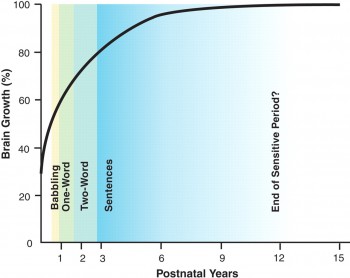Month 54
The more words a child hears, the faster he learns language. The sound of words creates the neural circuitry that is necessary for children to develop language skills.

Windows of opportunity for language development occur throughout life. The window for syntax or grammar is open during the preschool years and may close as early as five or six years of age, while the window for adding new words never closes completely.
Parents can support their child's brain development for language during these times by providing experiences that allow the child to practice emerging skills. Opportunities during the course of the day to engage in face-to-face interaction, hear language being spoken, listen to the written word read aloud, and practice associating objects with words provide language experiences without undue stress or overstimulation.
At this age, the brain is getting better at forming mental symbols for objects, people, and events. This is directly related to the growing ability to use many more words and short sentences.
How I think @ 54 months
At this age your child is well on his way to understanding and using complex language abilities. Your child is soaking up information like a sponge though he still may not know how to "use it all" the right way.
Motor Development: Gross Motor Skills
• I can stand on tiptoes with arms held overhead, without moving feet, and without swaying more than 20 degrees for eight seconds
• I can throw a ball overhand from 12 feet away and hit a two foot target (two feet above floor)
Motor Development: Fine Motor Skills
• I can button and unbutton one button in 20 seconds or less
• I can grasp marker between thumb and pad of index finger. Marker rests on first joint of middle finger
Language and Thinking Development
• I play with words (I create my own rhyming words!)
• I can stack five objects in order size
• I can sort group of objects in more than one way (e.g, by shape and then by size)
Social and Emotional Development
• I show pride in accomplishments
• I can indicate when I feel sorry
• I usually prefer playing with other children than playing alone
• I can talk about my own feelings
Activities
Disclaimer: This presents an overview of child development. It is important to keep in mind that the time frames presented are averages and some children may achieve various developmental milestones earlier or later than the average but still be within the normal range of development. This information is presented to help parents understand, at a high level, what to expect from their child. Any questions/concerns you may have about your child’s development should be shared with your doctor.




